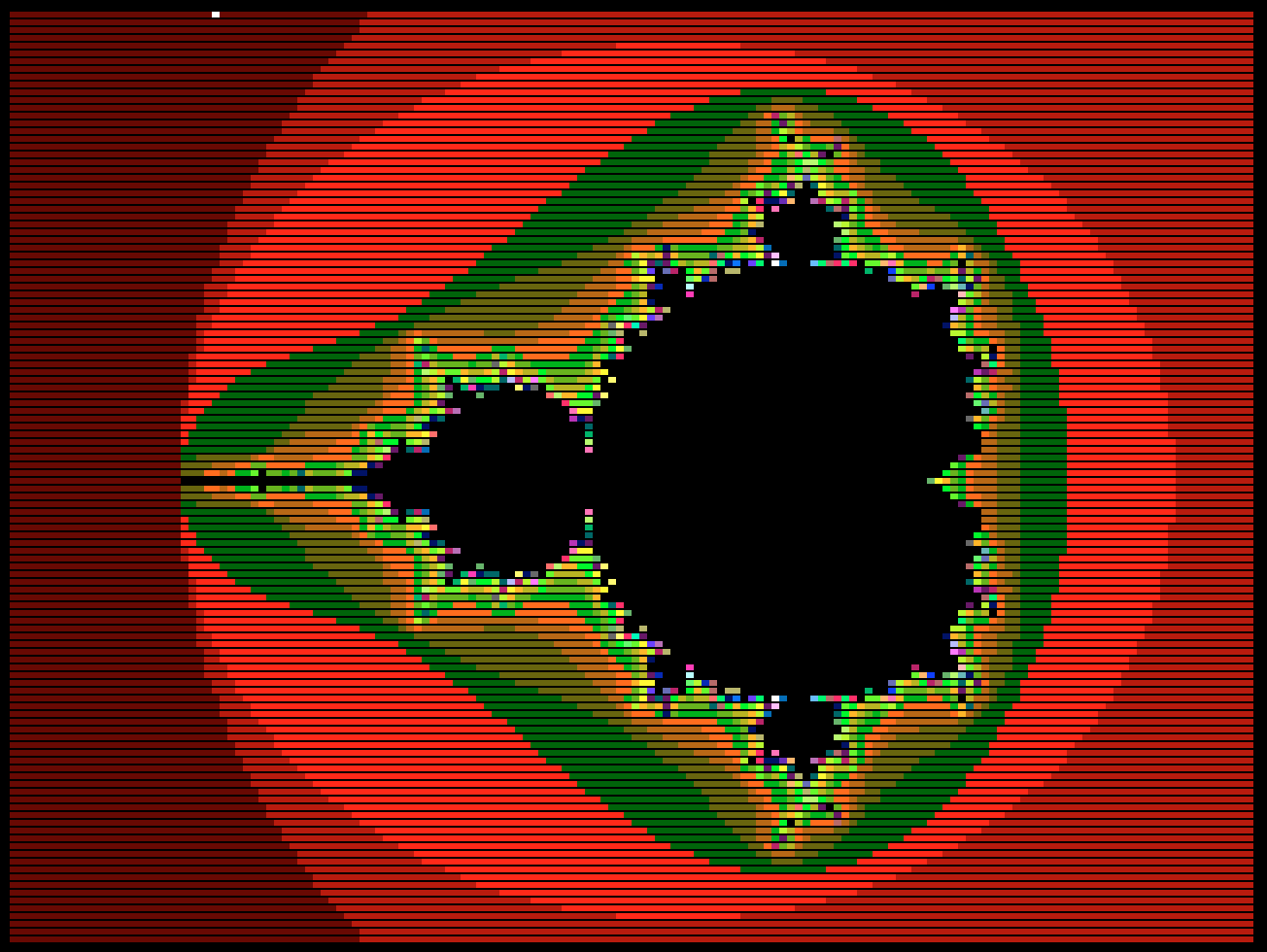I got a bit stuck with the work I was planning for today, so I wrote something else to regain motivation: a fractal! Rendering takes a while (8242 seconds), being fully interpreted and lacking multiplication, and even without the "right-shift" operation you badly need for this. All those must be mimicked with slow high-level code using just addition and subtraction. [Edit: it takes 1127 seconds now with native code for "right-shift"]

It should be easy to speed the whole thing up a lot just by adding a right-shift assembly function. Next time... GCL source code:
{-----------------------------------------------------------------------+
| |
| Mandelbrot fractal |
| |
+-----------------------------------------------------------------------}
gcl0x
{
Plot the Mandelbrot set
- 160x120 pixels and 64 colors
- Faithful translation of mandelbrot.c pre-study
- Use 16-bit vCPU math as 7-bit fixed point arithmetic (1.00 -> 128)
- Implement multiplication in interpreter
- Implement shift-right in interpreter as well
- A bit slow (8242.655 seconds)
XXX At the end change all to grey tones and redo
XXX Redo at different sections
XXX Tone for every pixel value
}
{-----------------------------------------------------------------------+
| RAM page 3 |
+-----------------------------------------------------------------------}
$0300:
{ Pretty accurate multiply-shift ((A*B)>>7), but it can be off by one }
[def
push
{Extract sign and absolute values}
0 sign= C=
{0}A- [if>0 A= 1 sign=]
0 B- [if>0 B= sign 1^ sign=]
{Multiply}
7 shift= {Pending shift}
$200
[do
bit=
-$4000 C+ [if<0
C C+ C=
else
{Shift prematurely in an attempt to avoid overflow}
B ShiftRight! B=
shift 1- shift=]
{Add partial product}
A bit- [if>=0
A=
C B+ C=]
bit ShiftRight! if<>0loop]
{Shift}
[do
C ShiftRight! C=
shift 1- shift= if>0loop]
{Apply sign to return value}
sign [if<>0 0 C- else C]
pop ret
] MulShift7=
{ Calculate color for (X0,Y0) }
[def
push
0 X= XX= Y= YY= i=
[do
i 1+ i= 64^ if<>0 {Break after 64 iterations}
{Mandelbrot function: z' := z^2 + c}
X A= Y Y+ B= MulShift7! Y0+ Y= {Y = 2*X*Y + Y0}
XX YY- X0+ X= {X = X^2 - Y^2 + X0}
{Calculate squares}
{X}A= B= MulShift7! XX=
Y A= B= MulShift7! YY=
-$200 XX+ YY+ if<0loop] {Also break when X^2 + Y^2 >= 4}
i
pop ret
] CalcPixel=
{-----------------------------------------------------------------------+
|}\vLR>++ ret{ RAM page 4 |
+-----------------------------------------------------------------------}
$0400:
[def
push
$7ff p= {Start of video (minus 1 to compensate for 1st step)}
-323 X0= 3 DX= 161 Width= {Horizontal parameters}
-180 Y0= 0 DY= 120 Height= {Vertical parameters}
[do
{Length of next segment, either horizontal or vertical}
DX [if<>0 Width 1- Width= else Height 1- Height=] if>0
[do
len=
{Step in the fractal plane}
X0 DX+ X0=
Y0 DY+ Y0=
{Matching step in video frame}
DX [if<0 p 1- p=]
DX [if>0 p 1+ p=]
DY [if<0 -$100 p+ p=]
DY [if>0 $100 p+ p=]
63 p. {White while busy here}
{First check if we are inside one of the main bulbs for
a quick bailout (Wikipedia)
(x+1)^ + y^2 < 1/16}
Y0 A= B= MulShift7! YY=
X0 128+ A= B= MulShift7! YY+ 8- [if<0 0
else
{q*(q + x - 1/4) < 1/4*y^2, where q = (x - 1/4)^2 + y^2}
X0 32- A= B= MulShift7! YY+ {q}
A= X0+ 32- B= MulShift7! tmp=
tmp+ tmp= tmp+ tmp= {*4} YY- [if<0 0
else
{Otherwise run the escape algorithm}
CalcPixel!
]]
p. {Plot pixel}
len 1- if>0loop]
DY tmp= DX DY= 0 tmp- DX= {Turn right}
loop]
pop ret
] CalcSet=
{-----------------------------------------------------------------------+
|}\vLR>++ ret{ RAM page 5 |
+-----------------------------------------------------------------------}
$0500:
{ Stupid shift-right function }
{ XXX Better make a SYS extension for this }
[def
a= 0 b=
$8000 a+ [if>=0 a= $4000 b+ b=]
$c000 a+ [if>=0 a= $2000 b+ b=]
$e000 a+ [if>=0 a= $1000 b+ b=]
$f000 a+ [if>=0 a= $0800 b+ b=]
$f800 a+ [if>=0 a= $0400 b+ b=]
$fc00 a+ [if>=0 a= $0200 b+ b=]
$fe00 a+ [if>=0 a= $0100 b+ b=]
$ff00 a+ [if>=0 a= $0080 b+ b=]
$ff80 a+ [if>=0 a= $0040 b+ b=]
$ffc0 a+ [if>=0 a= $0020 b+ b=]
$ffe0 a+ [if>=0 a= $0010 b+ b=]
$fff0 a+ [if>=0 a= $0008 b+ b=]
$fff8 a+ [if>=0 a= $0004 b+ b=]
$fffc a+ [if>=0 a= $0002 b+ b=]
a 2& [if<>0 b<++ ]
b ret
] ShiftRight=
{-----------------------------------------------------------------------+
|}\vLR>++ ret{ RAM page 6 |
+-----------------------------------------------------------------------}
$0600:
{ Main }
[do
CalcSet!
60 \soundTimer. {For debugging}
loop]
{-----------------------------------------------------------------------+
| End |
+-----------------------------------------------------------------------}
 Marcel van Kervinck
Marcel van Kervinck
Discussions
Become a Hackaday.io Member
Create an account to leave a comment. Already have an account? Log In.
% I'm Mandy, fly me... %
Great implementation, love the low level maths. :-D
Are you sure? yes | no
Nice work :D
Are you sure? yes | no
Very nice! I used to write these when I got bored at work - they're always fun. Did one in SQL once - I had a big table full of pixels :-)
Are you sure? yes | no
You are not alone. There is a Mandelbrot implementation in Brainf*ck. And there is a BF to COBOL compiler... https://www.vanheusden.com/misc/blog/2016-05-19_brainfuck_cobol_compiler.php
Are you sure? yes | no
this is cool :)
Are you sure? yes | no
Pretty cool! I did something similar for my FPGA CPU design, experimenting with opcodes for multiply vs software implementations. It's a great visual project to encourage you to do more tinkering.
Are you sure? yes | no
Thanks! In fact this was low hanging fruit. Indeed, one more speedup should be possible by migrating the fixed point multiplication logic into assembly. The challenge is to break it up into parts that can run within one scan line, but of course multiplication lends itself very well for that. I will keep that on "todo" for a later stage though. Current subproject is to add the ability to download code into RAM over the input interface through and Arduino.
Are you sure? yes | no